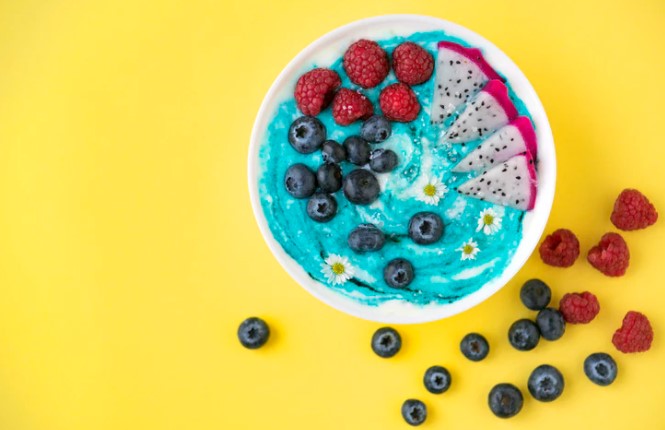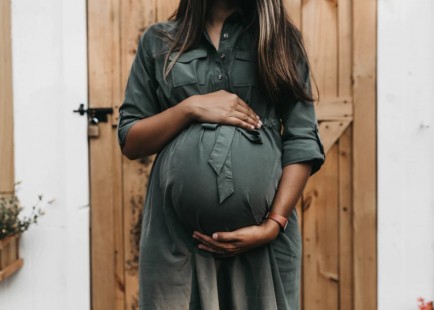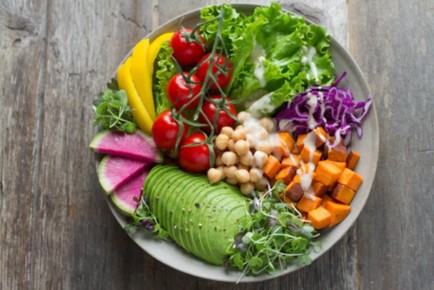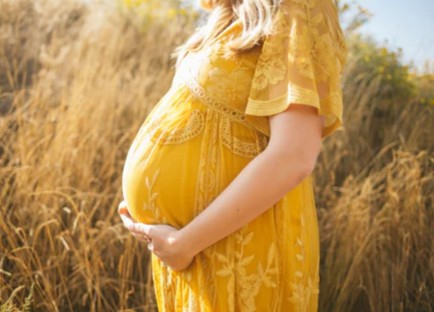Food and fertility are linked. If you and your partner stick to a healthy, balanced diet, you may be able to boost your chances of conceiving. Being a healthy weight primes your body for baby-making, and eating well lays down stores of nutrients that will get your pregnancy off to the best start.
Eating healthily simply means getting a variety of foods from different food groups. Try to include the following in your diet each day:
- At least five portions of fruit and vegetables, whether fresh, frozen, canned or dried. Fruit and veg juices and smoothies count as one of these portions. Bear in mind that juices can be quite sugary, so you may want to limit them to one 150ml glass a day.
- Base your main meals around wholegrains and potatoes, which will provide starchy carbohydrates and fibre, as well as plenty of important vitamins and minerals. This could include wholemeal bread, brown rice, wholegrain cereals and pasta.
- Include some protein at each meal, such as lean meat and poultry, fish, eggs, and pulses such as beans and lentils. Try to eat at least two portions of fish a week. One of these should be oily, but try to have no more than two portions of oily fish a week.
- Some dairy foods that contain calcium, such as milk, yoghurt and cheese. Aim for two portions to three portions a day. If you’re counting calories, consider choosing lower-fat varieties, and opt for yoghurts with no added sugar.
- Some iron-rich foods such as red meat, pulses, dried fruit, bread, green vegetables and fortified breakfast cereals. These build up your resources of iron in preparation for pregnancy.
Try to have something containing vitamin C, such as a glass of fruit juice, alongside iron-rich meals. This helps you to absorb iron from non-meat sources. Make cakes, pastries, fizzy drinks and fast foods an occasional treat. These tend to be high in fat, sugar and salt. They may fill you up, but they aren’t usually nutritious. There’s no official guidance on what counts as “occasional”, so be realistic and set your own limits. For example, you may prefer to avoid unhealthy foods during the week and have a takeaway and a slice of cake during the weekend. Or you could nominate Friday as your chocolate day – whatever works for you. But remember that “occasionally” does not mean daily!
The government’s eatwell plate is a useful visual guide to the proportion of each food group that should make up your daily diet. If you’re wondering when you should start to improve your diet, there’s no time like the present. A healthy diet is important both before and during pregnancy.
Try to get as close as possible to a healthy weight for your height before trying for a baby. Ideally, your body mass index (BMI) should be between 20 and 25. If you’re not sure whether you’re a healthy weight, check out our BMI calculator. Being overweight or underweight can reduce your chances of conceiving. But that’s not the only reason for getting to a healthy weight before you begin trying for a baby. Being underweight before conceiving is linked to an increased risk of having a baby with a low birth weight or who is small-for-dates. Babies who are born small are at a higher risk of a range of health problems as they grow, so gaining a few pounds now is a great way to give your baby a better start in life. If you’re struggling to gain weight, your GP may be able to refer you to a dietitian for expert advice.
Being overweight before conceiving has been linked to increased risk of complications once you’re pregnant. In particular, obese women have a higher risk of health issues including gestational diabetes, pre-eclampsia, and, sadly, miscarriage. Dieting during pregnancy is not recommended. Extreme weight loss from crash-dieting can use up the vitamins and minerals in your body, so there aren’t enough left for a healthy pregnancy. Losing weight gradually through healthy eating and regular exercise is the best option, so now’s a great time to start making healthy eating choices that you can stick to once you do conceive.
Exercise is important, too. Try to build a little extra activity into your daily life, perhaps by walking briskly to work, getting off the bus one stop earlier, or taking the stairs instead of the lift. Talk to your GP if you need advice about changing your diet or starting exercise. Joining a group can help you to stay motivated to lose weight and keep it off. You’ll be offered regular advice on exercise and diet, as well as support from others. In fact, evidence shows that overweight women who are having trouble conceiving tend to get pregnant quicker if they join a weight-loss group than if they try to lose weight on their own.
Aim to lose no more than between 0.5kg (1lb) and 1kg (2lb) a week, even if you’re very overweight. This kind of long-term lifestyle change is more successful than a quick-fix approach.
If you’re overweight and are trying to eat more healthily, these tips may help:
- Make time for breakfast every day, and try to include protein-packed foods such as eggs and yoghurts. These can help to make you feel fuller for longer and prevent hunger pangs later on that may lead to unhealthy snacking.
- Keep an eye on your portion sizes at mealtimes. You may find that eating from a smaller plate helps you to keep your portions in check.
- Have healthy snacks to hand, such as a handful of fresh or dried fruit. That way you won’t succumb to high-sugar, high-fat options when you’re out or at work.
You should take a daily 400 microgram (mcg) supplement of folic acid from the day you start trying to conceive until the 12th week of pregnancy. This helps to protect your baby from potentially serious neural tube defects, such as spina bifida.
Your GP may prescribe you a higher daily dose of folic acid (5mg, which is 5000mcg) if:
- you have had a child with a neural tube defect, such as spina bifida
- you, your partner or an immediate relative has a neural tube defect
- you have coeliac disease, diabetes or thalassaemia
- you are taking anti-epileptic drugs
- you have sickle cell disease
- your BMI is higher than 30
Most women don’t need a general preconception multivitamin, as it’s better to get all the nutrients you need from your food if you can. But you may find a supplement helpful if you’re finding it hard to have a varied diet. If you do decide to take a multivitamin, make sure it’s suitable for use in pregnancy and doesn’t contain vitamin A or fish liver oil. Both of these could harm your baby if you’re taking them when you do conceive.
If you’re taking individual supplements, such as folic acid, check whether the multivitamin contains the same nutrients, and make sure you’re getting the right amount in total. You can always ask your pharmacist if you have any questions. Once you’re pregnant, you should continue to take a daily 10mcg supplement of vitamin D, which is what the government recommends for everyone over one year old. If you have a darker skin tone or don’t get much sunlight, your GP may recommend you take a higher dose. If you’re on certain benefits, you may be eligible for free Healthy Start vitamin vouchers once you do conceive. See if you’re eligible at www.healthystart.nhs.uk.
Alcohol is unlikely to affect your fertility, though heavy drinking may affect your partner’s sperm. However, drinking can be harmful to a developing baby, particularly in the early weeks. The government therefore recommends that women should stop drinking alcohol altogether when trying for a baby and throughout pregnancy.
There’s no clear evidence that caffeine causes fertility problems if you’re trying for a baby naturally. However, it could affect your chances of success if you’re having fertility treatments such as IVF . Once you do conceive, too much caffeine could be harmful to your growing baby. So to be on the safe side, you may prefer to limit your caffeine intake to 200mg a day, which is what’s considered safe in pregnancy. Learn more about caffeine and conception.
It may do, but probably only if you have coeliac disease. It might help you if you have gluten intolerance (non-coeliac gluten sensitivity) but there isn’t enough evidence to be sure. For most people, gluten doesn’t cause any problems and shouldn’t affect your fertility. But if you have coeliac disease or gluten intolerance, cutting it out of your diet might improve your ability to absorb nutrients that you need to be able to conceive. Not sure if you’re sensitive to gluten? See your GP if you experience diarrhoea, tummy pain, bloating and indigestion after eating foods containing wheat, barley or rye. Don’t cut gluten out of your diet completely without speaking to your GP first.
While you’re trying to conceive, you may prefer to steer clear of any foods that aren’t safe in pregnancy. That way, when you do become pregnant, you’ll know that you haven’t had anything that could harm your baby.
Foods to avoid in pregnancy include:
- Vitamin A supplements or foods that are high in the retinol form of vitamin A, such as liver and including fish liver oil.
- Shark, swordfish and marlin. You should also avoid eating more than two portions of oily fish, such as mackerel, sardines, salmon and trout, per week.
- Soft, mould-ripened, or blue-veined cheese such as brie, camembert or Danish blue. However, hard blue cheeses such as stilton, and non-mould-ripened soft cheeses such as cream cheese and cottage cheese are fine.
- Foods with an increased risk of food poisoning, such as raw or rare meat, fish and shellfish, undercooked eggs, and unwashed fruit and veg.
Original article: https://www.babycentre.co.uk/a3558/fertility-diet-for-women#ixzz5RjWeSADe































Comments